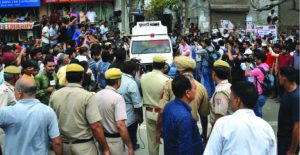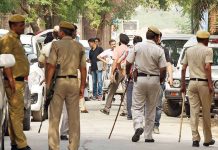 The handwritten notes found at the home of Burari family, of whom all the members were found dead on July 1, talk of apprehensions that the family may not see the next Diwali, because of “someone’s mistakes.” In the note dated November 11, 2017, Lalit, the 45-year old businessman who led the hangings, talks of “family’s mistakes” in “attaining something.”
The handwritten notes found at the home of Burari family, of whom all the members were found dead on July 1, talk of apprehensions that the family may not see the next Diwali, because of “someone’s mistakes.” In the note dated November 11, 2017, Lalit, the 45-year old businessman who led the hangings, talks of “family’s mistakes” in “attaining something.”
“Dhanteras aakar chali gayi. Kisi ki purani galti ke aabhaav se kuch prapti se door ho. Agli Diwali na mana sako. Chetavni ko nazar andaaz karne ke bajai gaur kiya karo (Dhanteras has already been celebrated. You have not achieved something due to someone’s past mistakes. You might not celebrate the next Diwali. Pay attention rather than ignoring the warnings),” the entry said.
Burari’s alleged mass suicides have the Delhiites horrified, with the police yet to come up with a convincing explanation for the family tragedy. The crime branch which is now investigating the deaths is piecing together evidence to crack the spine-chilling incident, which has left the neighbourhood in shock and bewilderment.
The postmortem reports of 10 bodies have revealed death by hanging, while postmortem reports of the eldest family member, Narayan Devi, is still awaited. The reports indicate the family members had hung themselves and no injury marks were found on the bodies.
Ten members of the Bhatia family in Delhi’s Burari were found hanging from iron mesh in their home on the morning of July 1, one of the bodies was found on the floor, which was apparently strangulated. The dairies written by the family members carried the details of the ‘death ritual’ detailing how the family was to execute the ‘suicides.’ Further, the crime branch has also found a register containing notes about “salvation”, “shunya” and “appeasing God.”
77-year-old Narayan Devi, her two sons Bhavnesh Bhatia (50) and Lalit Bhatia (45), their wives Savita (48) and Tina (42) respectively, Narayan’s daughter Pratibha (57) and five grandchildren, Priyanka (33), Neetu (25), Monu (23), Dhruv (15) and Shivam (15) were found blindfolded with their mouths covered with while cloth. The limbs of the eight of the bodies were tied.
The closest relatives of the Bhatias are however denying that the family indulged in any kind of occult activities, and police has not found the involvement of any baba in the case. The police are now investigating the angle of ‘shared psychosis’, which is a psychiatric syndrome in which symptoms of a delusional belief are transmitted from one individual to another.

The investigating authorities also claim to have found notes which indicated that Lalit Bhatia, who is believed to have led the rituals, had assumed his father’s alter ego. Lalit would often talk and behave like his father, sometimes observing ‘maun vrat’.
The conversations of the family’s children with the neighbours also confirmed this aspect. The notes from 2008 were recovered, which indicated that Lalit Bhati had turned to spiritual practices soon after his death. The family had been convinced that he had been possessed with his father’s soul. The police also while digging deep and examining the browsing history from his phone found that he often used to watch paranormal videos and ghost shows. Further investigations showed the family had been preparing for the ‘ghostly’ ritual for about ten days in advance.
What is more befuddling is that no one in the neighbourhood or even the Bhatia family’s closest relatives had the whiff of what was coming. The family had been busy in marriage preparations; the engagement had just recently been concluded.
The written account of their plan is the basis of all the conclusions the police has drawn from the incident, the notes contains meticulous planning of the deaths. However, the police maintain that the aim of the ritual was not to commit suicide, but the incident ended up in tragedy, quite unexpectedly. The family was convinced that they will achieve ‘salvation’ with their act and will be rescued by the spirit at the last moment, according the reports by the police.
The neighbours are steering clear of passing by the house even in the day, considering the circumstances in which the deaths happened. The people living in this Sant Nagar colony are having wild imaginations about what might have compelled the family to take the extreme step. There is an atmosphere of inexplicable fear amongst the people in the area and it is said the buzzing activity in the colony goes off as the darkness descends.
It isn’t just the Burari, the story created shock and horror across the country as the details of the incident emerged. The story was reported in the international press as well.
While there is no evidence to point to an external hand in the deaths, the police say they are still looking at all angles to unravel the mystery. The house is being thoroughly examined by forensic experts, the psychiatrists and the crime branch itself, besides the saints who are well versed with the rituals associated with occult practices.
The practices of superstition are still very common in the Indian society. It is therefore not a surprise that people resort to such practices and harbor such thinking even in these times. The Burari case however stands apart in the way the ‘religious ritual’ was planned and executed, the case took the superstition practices to the extremes. The incident shows how deep the practices of superstition and witchcraft are entrenched within the Indian society. We hear the stories of women burnt on suspicion of witchcraft every day from different states across India. So much development and education has not helped eradicate dogmatic beliefs from our society. We still have a long way to go to embrace modern thought and reason.












